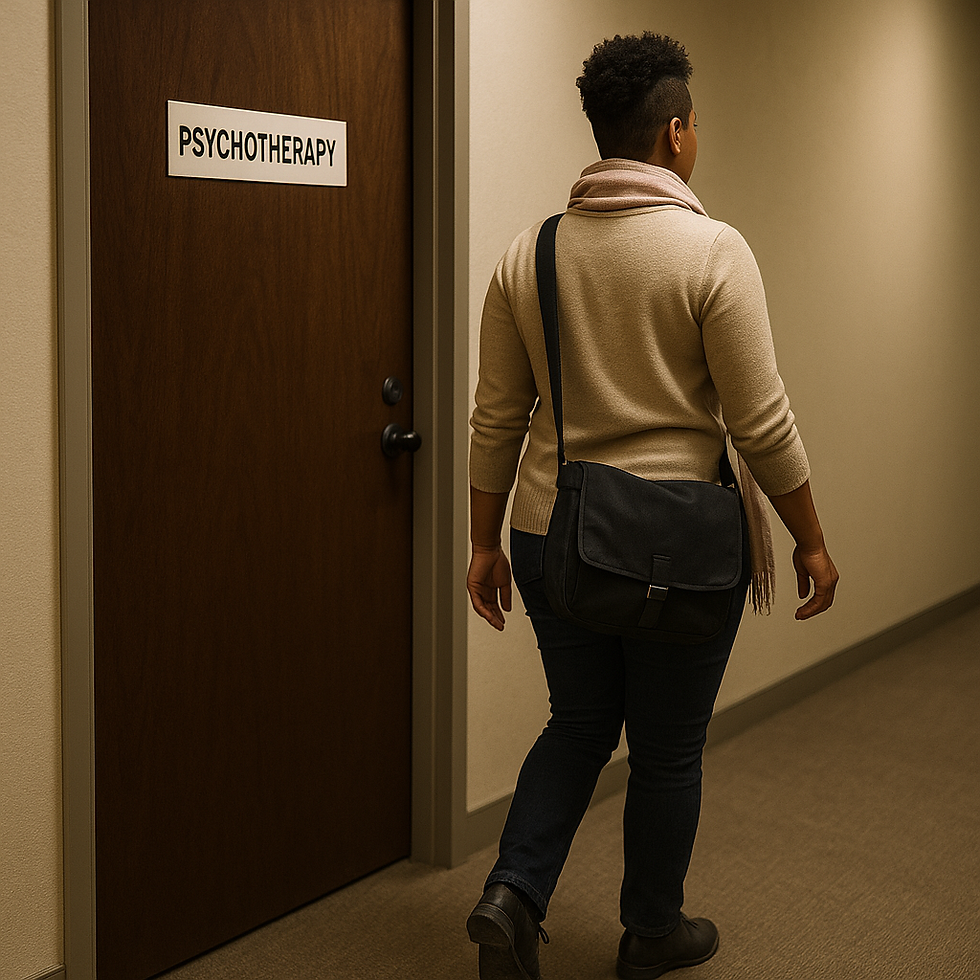How to Vet a Non-Monogamous Affirming Therapist: A Guide for Polyamorous and Open Clients
- Sarah Wolfer, LICSW

- Jul 18, 2025
- 3 min read
Updated: Jul 19, 2025
By Sarah Wolfer, LICSW
Founder, Courageous You
Finding a therapist who truly gets non-monogamy shouldn’t feel like a high-stakes scavenger hunt. But for many polyamorous and open folks, that’s exactly what it is.
Too often, therapy becomes the place where you end up explaining your relationship style instead of receiving support for what brought you in. It can be exhausting, invalidating, and even harmful. The good news? You can take control of the search.
This guide will help you identify red flags, ask the right questions, and find a provider who respects your autonomy, understands non-monogamous structures, and won’t mistake your love life for a pathology.

Step 1: Know What You're Looking For
Before vetting therapists, clarify your needs:
Are you looking for individual, relationship, or polycule therapy?
Are you dealing with general mental health concerns or non-monogamy specific challenges?
Do you want a therapist who is non-monogamous affirming, knowledgeable, or experienced?
Remember: "Sex-positive" or "LGBTQ+ friendly" doesn’t automatically mean non-monogamous competent.
Step 2: Use the Right Tools to Search
Look for therapists on:
The Kink and Poly Aware Professionals (KAP) Directory
Psychology Today with filters like "Non-Monogamy"
Local non-monogamy community referrals and social groups
Non-monogamy-affirming professional organizations
Pro tip: Google phrases like "polyamory-affirming therapist near me" or search therapist bios for terms like "relationship diversity," "non-monogamy," or "polyamorous relationships."
Step 3: Screen Like a Pro (Before Booking)
A therapist’s website is a goldmine. Look for:
Direct mentions of non-monogamy, polyamory, relationship anarchy, etc
Language that centers client autonomy and celebrates diversity
Blog posts, podcasts, or training history showing active learning
Red flags include:
No mention of non-monogamy or relationship diversity at all
Language that frames monogamy as the norm or the goal
Ambiguous references to "alternative lifestyles" without clarity
Step 4: Questions to Ask When Searching for a Non-Monogamy-Affirming Therapist
During a phone consult or first session, consider asking:
What experience do you have working with non-monogamous clients?
How do you approach relationship structure diversity in therapy?
Are you familiar with terms like polyamory, metamour, compersion?
What training, education, or lived experience do you have around non-monogamy?
You deserve clear, confident, respectful answers. Hesitation, discomfort, or deflection? That’s your cue to keep looking.
Step 5: Trust the Vibe (and Your Gut)
Non-Monogamy affirming therapy should feel:
Curious, not judgmental
Informed, not voyeuristic
Collaborative, not corrective
Notice how the therapist responds to:
Your language (do they mirror it respectfully?)
Your concerns (do they center your needs or redirect to structure?)
Your identity (do they try to "understand" you or assume they already do?)
Step 6: Set Boundaries and Be Willing to Walk
You don’t owe your therapist an education. You don’t have to stay in a harmful dynamic. And you absolutely can:
Correct misinformation
Say what feels supportive vs. pathologizing
Leave if your non-monogamous identity is not respected
Sometimes the most affirming act is walking away from a provider who’s not ready for you.

Bonus: Non-Monogamy Challenges That May Come Up in Therapy
Even affirming therapists need to be ready for the real-life complexities of non-monogamous relationships, such as:
Jealousy and compersion navigation
Communication and scheduling across multiple partners
Metamour dynamics
Legal/medical system stress
Coming out to family, kids, or at work
A good therapist won’t shy away from these topics or treat them as proof that non-monogamy "doesn’t work."
Final Thoughts on Finding a Non-Monogamous Affirming Therapist
Therapy can be a place of healing, integration, and growth, when your relationship style is respected, not treated like a diagnosis. With the right information and a clear sense of your needs, you can find a therapist who meets you where you are, celebrates your capacity for connection, and helps you thrive.
Need Extra Support Navigating Non-Monogamy?
At Courageous You, we offer therapy that honors the full spectrum of your relationships, without judgment or assumptions. Whether you’re seeking individual support, exploring polycule dynamics, or moving through grief, identity shifts, or major transitions, our work is spacious, trauma-informed, and deeply relational.
We also support therapists and organizations who want to better serve non-monogamous clients. Through consultation, training, and supervision, we help professionals move beyond checkbox inclusivity toward truly affirming, liberatory care.
From ongoing therapy to ketamine-assisted sessions, private retreats, intensives, and professional training, we offer multiple ways to connect and grow. Explore our services or reach out for a free consultation to see how we can work together.





Comments